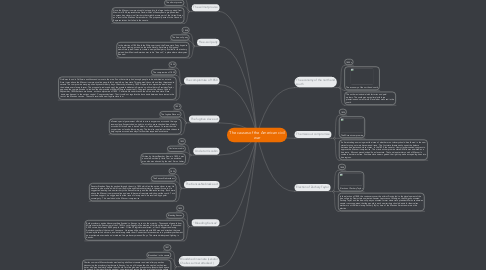The causes of the American civil war
von James spriggs

1. The economy of the north and south
1.1. 1800's
1.2. The economy of the north and south
1.3. The noth was industrial with factories and paid workers. The south was agricultural with large plantation and small farms. Slave labor was used in the south.
2. The missiouri compromise
2.1. 1820
2.2. The Missouri compromise
2.3. As America began moving west the issue of whether or not slavery should be allowed in the new states forming out west became and issue . The first state threatened to upset the balance between free states and slave states . In the 1820, the senator Henry clay persuaded congress to approve the Missouri compromise . The missiouri compromise stated. Marie was admitted as a free state . Missouri was admitted As a slave state. The Louisiana territory north of Missouri's southern border was free. Southern slave owners gained the right to pursue escaped fugitives into free regions.
3. The wilmot proviso
3.1. 1848
3.2. The wilmot proviso
3.3. Since the Missouri compromise did not apply to the large territory gained from Mexico in 1848, representative David wilmot of Pennsylvania proposed that congress ban slavery in all territory that might become part of the United States as a result of he Mexican American war . The proposal passed in the House of Representatives but failed in the senate.
4. Free- soil party
4.1. 1848
4.2. The free-soil party
4.3. In the election of 1848 both the Whigs party and the Democratic Party hoped to win by not taking a stand on the issue slavery. Antislavery Whigs and democrats joined forces to create a new political party. It called for the territory gained from Mexican-American war to be "free soil," a place where slavery was banned.
5. Election of Zachary Taylor
5.1. 1848
5.2. Election of Zachary Taylor
5.3. In the election of 1848, the controversy over the wilmot Proviso led to the development of the free soil party. Democrats nominated senator Lewis cass of Michigan, the Whigs nominated Zachary Taylor and the free-soil party nominated former democratic president Martin vanburden senator cass suggested that the people in each new territory should decide for themselves wether or not to allow slavery. Zachary Taylor, hero of the Mexican American war won the election.
6. The compromise of 1850
6.1. 1850
6.2. The compromise of 1850
6.3. Gold was found in California and thousands move to the area. Soon the territory had enough people to be admitted as a state. Since it was above the Missouri compromise line people felt it would be a free state. This angered the south and they threatened to secede. The compromise was proposed by senator henry clay of Kentucky in January, 1850. Hoped this compromise would end the debate over slavery forever. This proposal produced one of the greatest debates in America's political history. President Taylor opposed the compromise but died and the new president Millard Fillmore supported it. Congress passes five series of bills in September, 1850 that become known as the compromise of 1850 . California was admitted to the union as a free state. Slave trade was banned in the nations capital . Congress declared. That it could not regulate the slave trade between slave states in the rest of the Mexican cession. The south received a new fugitive slave law.
7. The fugitive slave act
7.1. 1850
7.2. The fugitive Slave act
7.3. allowed special government officials to arrest any person accused of being a runway slave. Suspects had no right to a trail to prove they had been falsely accused. All it took was a slave holders or white witness to swear that the suspect was a slave holders property. The law also required northern citizens to help capture accused runaways if athourities requested assistance
8. Uncle tom's cabin
8.1. 1852
8.2. Uncle toms cabin
8.3. Written by Harriet Beecher Stowe in 1852, it was a novel about kindly Uncle Tom, an enslaved man who was abused by the cruel Simon Lehrer
9. The Kansas-Nebraska act
9.1. 1854
9.2. The Kansas-Nebraska act
9.3. Senator Stephen Douglas pushed through the act in 1854 which led the nation closer to war. He wanted to see a railroad built from Illinois through Nebraska territory to the pacific coast. He suggested creating two new territory's the Kansas territory and the Nebraska territory. Both were above the Missouri compromise line and would become free states which upset the south. T win southern support , he suggested that the issue of slavery would be resolved by popular sovereignty . This would undo the Missouri compromise .
10. "Bleeding Kansas"
10.1. 1855
10.2. Bleeding Kansas
10.3. Both proslavery and antislavery settlers flooded to Kansas try to win the majority . Thousands of people from Missouri entered Kansas in march of 1855 to vote illegally in the election of territorial legislature . Kansas had 3,000 voters but almost 8,000 people voted. Of the 39 legislatures elected , all but 3 supported slavery. Antislavery settlers I the town of Lawrence He returned the next month with 800 men and attacked the town three days later John brown , and antislavery settler from Connecticut let seven men to a proslavery settlement near pottawatomie creek and murdered five proslavery men and Boys. This started widespread fighting in Kansas.
11. Bloodshed in senate (senator Charles sumner attacked )
11.1. 1857
11.2. Bloodshed in the senate
11.3. Charles sumner of Massachusetts was leading abolitionist senator and made fiery speeches denouncing the proslavery legislature In Kansas. In one of his speeches he singled out Andrew but.er who was an elderly senator from South Carolina who was present not present when he gave his speech. A few days later his nephew , congressman Preston brooks , marched into the senate chamber and beat sumner with a heavy cane until he fell to the floor bloody and unconscious. Sumner never really recovered from his injuries.


